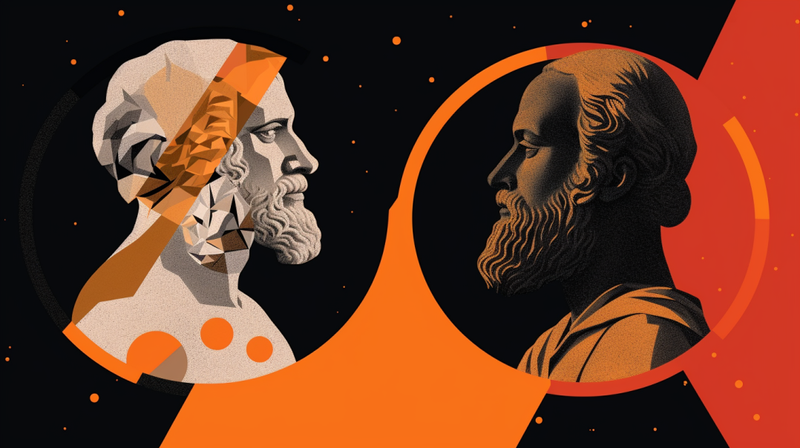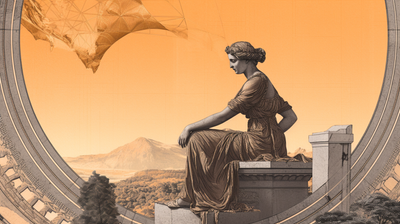From Plato to Postmodernism: Tracing the Evolution of Philosophical Thought
Philosophical thought has long been an essential cornerstone of human intellectual exploration, shaping our understanding of the world and our place within it. The evolution of philosophical thought, from the ancient wisdom of Plato to the complexities of Postmodernism, reflects humanity's enduring quest for knowledge and meaning. Tracing this journey gives us insight into the shifting paradigms and diverse perspectives that have shaped our intellectual landscape.

Plato: The Quest for Ideal Forms and the Allegory of the Cave
Plato, a towering figure in ancient philosophy, sought to unravel the nature of reality and the essence of human existence. In his dialogues, he explored the concept of ideal forms, positing that the material world we perceive is merely a poor reflection of ultimate reality. The famous Allegory of the Cave vividly depicts the human condition, where individuals are chained, perceiving only shadows on a cave wall. Plato's vision was to guide the soul toward the realm of actual knowledge, the world of the Forms.
Aristotle: Reason, Teleology, and the Pursuit of Knowledge
Aristotle, a student of Plato, took philosophical inquiry in a different direction. He emphasized the importance of empirical observation and logical reasoning in understanding the world. Aristotle's teleological view argued that everything in nature has a purpose, and we can uncover these inherent purposes through careful examination and categorization. His influence extended beyond philosophy into various scientific disciplines, leaving an indelible mark on Western thought.
Renaissance and Enlightenment: Rediscovering Human Agency and Rationality
The Renaissance marked a rebirth of intellectual and artistic pursuits, fostering a renewed interest in ancient philosophical ideas. Philosophers like Descartes and Locke sought to understand the human condition by emphasizing individual agency and rationality. Descartes' famous axiom, "I think, therefore I am," encapsulated the shift toward focusing on subjective experience and the capacity for reason. The Enlightenment further propelled these ideas, advocating for scientific inquiry, liberty, and human progress.

Nietzsche and Existentialism: Nihilism, Will to Power, and the Death of God
Friedrich Nietzsche challenged traditional philosophical assumptions as the 19th century drew close. He famously declared, "God is dead," announcing a crisis of faith and morality. Nietzsche's philosophy centred on the will to power and the rejection of universal truth, highlighting existence's inherent chaos and ambiguity. His ideas laid the groundwork for existentialism, which explored the individual's search for meaning and the responsibility to create it in an uncertain world.
Postmodernism: Deconstruction, Power Structures, and Fragmented Realities
Postmodernism emerged in the 20th century as a reaction against modernist certainties and grand narratives. Thinkers like Jacques Derrida and Michel Foucault deconstructed language, institutions, and power structures, revealing the complexities and hidden biases beneath seemingly objective truths. Postmodernism questioned absolute knowledge, emphasizing reality's subjective nature and interpretations' diversity. It challenged established hierarchies, calling for an appreciation of diverse perspectives and marginalized voices.

Conclusion:
The evolution of philosophical thought from Plato to Postmodernism showcases the vibrant tapestry of human inquiry. Each era and philosopher built upon the intellectual foundations of their predecessors, expanding our understanding of reality, consciousness, and the human condition. From the quest for ideal forms to the deconstruction of language and power, philosophical thought has continually evolved, reflecting the ever-changing nature of human thought and the complexities of our existence.
By tracing this evolution, we gain a deeper appreciation for the diversity of philosophical perspectives and the dynamic nature of human knowledge. It reminds us that intellectual thought is not a stagnant realm but a continuously evolving dialogue, guiding us toward new insights and challenging our preconceptions. As we embark on our philosophical inquiries, we stand on the shoulders of these intellectual giants, inspired to explore new frontiers of thought and expand the boundaries of human understanding.

Plato Re-Imagined
This course offers 32 comprehensive lectures exploring most of Plato's dialogues. These lectures guide students toward a consilient understanding of the divine—a concept that harmonizes knowledge across disciplines and resonates with secular and religious leaders. As a bonus, Lecture #33 focuses on consilience, demonstrating how different fields of knowledge can converge to form a unified understanding.






